 School name: APOLLON University of Applied Sciences and University of Bremen.
School name: APOLLON University of Applied Sciences and University of Bremen.
Type of school: Both are universities in Bremen, a city in northern Germany
Classes you teach: Biological Psychology and Neuropsychology
Cognitive Psychology
Average class size: APOLLON University: 12-20 students, University of Bremen: 40 – 200 students
What’s the best advice about teaching you’ve ever received? Well, I guess the most important thing that makes a good teacher is that one really loves what one does: An experimental psychologist who is really fascinated by what she/he does (e.g. designing and conducting experiments) is way better at educating students than one who just provides the course because he/she has to. Students recognize the teacher’s intrinsic motivation and enthusiasm and get motivated, too. Hence, good advice would be: in order to be a good teacher one should only teach topics (1) which he/she is burning for (in terms of being very interested in something) and (2) which match her/his competences and skills. To put a long story short: Motivation is contagious!
What book or article has shaped your work as a psychology teacher?
Two books I really like due to their didactic qualities are “A student’s guide to Social Neuroscience” by Jamie Ward and “Discovering Statistics using …” by Andy Field [it’s a series of books providing hands on experience in statistics based on different packages like R (“Discovering Statistics using R”) or SPSS (“Discovering Statistics using SPSS”)]. “Teaching of Psychology”, the official Journal of the Society for the Teaching of Psychology (APA Division 2), often comes up with great articles concerning the teaching of psychology: some of them have definitely shaped my work as a psychology teacher!
 Briefly tell us about your favorite lecture topic or course to teach.
Briefly tell us about your favorite lecture topic or course to teach.
Basically I like courses most which (1) illustrate how psychological theory can be applied to solve real world problems (e.g. “Applied Social Psychology”) and (2) integrate approaches from different (psychological) disciplines. My favorite course is social neuroscience because here theories and methods from Psychology and Neuroscience are integrated in a very sophisticated way. My favorite lecture topics are cognitive control (executive functions) and emotion regulation.
Briefly describe a favorite assignment or in-class activity.
This highly depends on the course: in courses on social psychology and counseling I use role-playing games (or other games in which students need to take over others roles or perspectives) in order to train certain communicative skills. On the other hand, in cognitive psychology courses for instance, I think it is important to get hands-on experience in experimental work, hence I give students tasks like designing an experiment on their own or writing a research proposal.
What teaching or learning techniques work best for you?
This again depends on the setting: when I give a lecture in front of 200 students I prefer to provide teacher-centered education, which means giving a classical lecture (standing and presenting in the front of a huge lecture hall). In smaller groups (up to 40) I prefer the student-centered approach, meaning that there is lots of interaction between teacher and students and that students work on several hands-on tasks in small groups.
 What’s your workspace like?
What’s your workspace like?
Let me call it “creative chaos”: many books and manuscripts all over the place, some pieces of art on the walls and lots of interaction due to an open-door policy.
Three words that best describe your teaching style. Open-minded, compassionate, interdisciplinary.
What is your teaching philosophy in 8 words or fewer? Motivation is contagious!
Tell us about a teaching disaster (or embarrassment) you’ve had and how you dealt with the situation.
Once I was booked for a seminar, but the institution which booked me forgot to make any advertisement for my seminar. Hence, no one knew about it. Or no, one person did: one woman knew it directly from one of the oblivious organizers. But does it make sense to provide a seminar for only one person? Not really, don’t you think? Anyway, instead of going through the entire seminar we chatted about the seminar contents for more than one hour and I guess my lonesome student could even grasp some information from our chat. Hence, the situation was certainly embarrassing, but in the end not everything turned out being negative: finally one person got a one-to-one lecture (which is a quite good student-teacher ratio ;)
What is something your students would be surprised to learn about you?
Well, I guess they would be surprised that I was a "goth" for quite some years when I was younger. I still love the music of Peter Murphy and Bauhaus and listen to stuff from Trent Reznor (Nine Inch Nails), the Beauty of Gemina or Aesthetic Perfection in order to calm down (I believe that many people would rather get upset than calming down while consuming these sounds :)
What are you currently reading for pleasure?
Currently I'm reading two books in my free time: one of them is Neurotribes by Steve Silbermann (for quenching my thirst for non-fiction), the other (for quenching my thirst for fiction) is a novel from german author Frank Schulz called “Onno Fiets and the white Stag (German: Onno Fiets und der weisse Hirsch)”. Unfortunately the second one is only available in German, which is a great pity due to Frank Schulz being an amazing writer, perfectly combining intellect, humor and suspense enriched with psychological subtlety.
What tech tool could you not live without?
In the domain of education there are many! The most important one to me is definitely the computer itself. Anyway, to give a more “fine-tuned” answer I choose for “presentation tools”, under which I sum up the projector, the pointer and the presentation software. These tech tools kind of revolutionized modern education standards (which does not necessarily mean that this revolution is per se positive!).
What’s your hallway chatter like? What do you talk to colleagues about most (whether or not it is related to teaching/school)?
Our hallway chatter has many facets: Topics range from teaching via research to private stuff like e.g. cooking, holiday/weekend plans or thoughts about the worlds’ current cultural and political developments.
